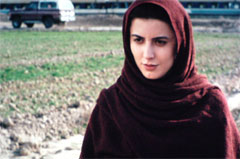
| HOME |
| NERVE |
| REVIEWS |
| ARCHIVE |
| EVENTS |
| LINKS |
| ABOUT US |
| CONTRIBUTORS |
| BACK ISSUES |
| CONTACT US |
 Deserted
Station
Deserted
Station
Showing at the FACT from 11th - 13th June
Reviewed by E. Hughes
Along time ago, when the Persian Empire was still dreaming, Persia, now Iran, was where much of the early world’s civilisation and culture was being produced, understood and effected. Modern-day Iran is a different story altogether. The film starts with a couple making a pilgrimage to the holy city of Mashad, but their 4-wheel drive breaks down before they get there, kicking off a chain of events, which, though unremarkable, are unforeseen and emotional.
I am not versed in Iranian film, culture, literature or what sort of people they really are, so the film is, for me, an open book waiting to be read. Cutting through the cultural layers, what we see is seen through our own cultural haze; what is Iranian? What is Iranian to us, and to them?
Iran is big, bleak and dusty, also green, wide and expansive. The nature of a people is often seen reflected in the countryside, and the towns and cities too. The film is an eye-opener and holds my interest from start to finish. It is a simple film, perhaps even clichéd, but the best stories are those that somehow have always been there, and impinge on a universal and human consciousness. The best stories are often the simplest, in this case big city people meeting rural poor people; the sophisticated meet the yokels, the busy meet the timeless, the found meeting the lost. It is all part of this movie, and no doubt can be found in folk tales all over the world. Of such makes the world spin.
The underlying theme of the movie is loss, in many forms, none more so than the main female role, who has, we find out, lost 2 children through still births. This heightens the tragedy, though she is surrounded by warmth, the warmth of strangers in a place far off the beaten track. Is this place mythic, or real? Well, for the film it is I think both real and symbolic, a place where thinking needs to be done, and values need evaluating. What is more important, to stop and think and take stock of a situation, or to go on ahead regardless? What is more important, the journey or the destination? What do we lose in the drive to be faster, busier, sophisticated, that we might find if we took some time just for ourselves?
In order to continue on their journey, the local teacher/mechanic/gopher/wide-boy has to get a part for their car, and the husband accompanies him on this journey. Meanwhile, the wife, the main female lead, teaches the class the teacher has left behind. This is when the story kicks in, and when the magic of the movie is really created. The kids are a funny lot, like the villagers in general, but are responsive to this stranger in their midst. On the Richter scale of importance, these desert villagers hardly register a fraction of a millimetre, on the scale of life, they register high because they are, like all of us, merely human beings.
In this film the old meets the new, the transient meets the non-changing, two different Irans, no doubt amongst many others compete for emphasis and the claim of a higher reality. Ancient and modern clash, and a new thing is born, one that will make each party see things in a new way, even if only temporarily. One of the most dreamy sequences is when the kids take their new teacher to play hide and seek amongst old train carriages; she becomes lost in thought, and lost to the moment. Cinematographically (there’s a word you don’t use every day!), this is a moment that film critics eulogise over; it was powerful simply because it is a spontaneous moment by the kids, and a sort of moment when the world stops spinning.
As they leave, the kids chase after them, not wishing to let them go, but go they must. Two realities have converged, and, perhaps inevitably, gone their separate ways. All in all, this film really moved me; it is not Hollywood Blockbuster or big budget, just a simple tale told well, with real emotions, jarring realities and honest sentiment. The best stories are, I think, the simplest.